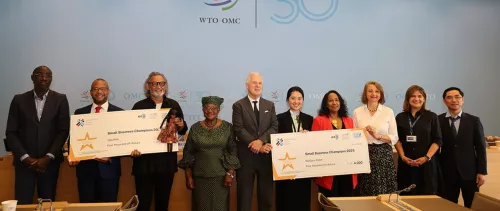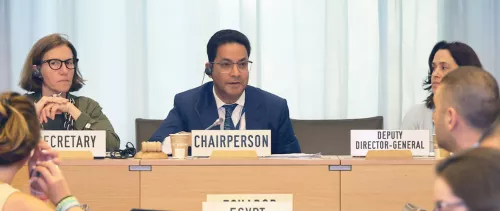
DG Okonjo-Iweala: Delivering meaningful development outcomes key to successful MC13
WTO Director-General Ngozi Okonjo-Iweala called on members to renew momentum in the discussions on development issues in the run-up to the 13th Ministerial Conference (MC13), to be held in Abu Dhabi in February 2024. Speaking at the General Council on 8 May, the Director-General urged members to continue efforts to build convergence and engage more in frank conversations that would allow the WTO to move forward its agenda.
DG Okonjo-Iweala reported on her recent trip to Ghana, Côte d'Ivoire and Kenya, where she addressed how to strengthen the WTO's partnership with the region and better help African members take advantage of the opportunities offered by re-globalisation.
During those meetings, the Director-General had the opportunity to discuss challenges and opportunities for Africa's development through trade and the role of the WTO in this regard. Productive conversations were held on addressing challenges in Africa's industrialization and job creation in the face of multiple global crises – as well as on debt and trade finance, digital and green trade, and developments related to the African Continental Free Trade Area (AfCTA).
The DG also met trade ministers of the Economic Community of West African States (ECOWAS) in a roundtable on “Implementation of the results of the 12th WTO Ministerial Conference (MC12), and success for MC13".
"There was a great deal of appreciation for what members did at MC12 and I talked about renewed momentum towards MC13," she said.
DG Okonjo-Iweala noted that one of the areas where WTO members need to make progress is on development discussions, both within the context of WTO reform and in the work of the Committee on Trade and Development (CTD) and the Committee on Trade and Development in special session (CTDSS).
"The eyes of Africa are on us, specifically on special and differential treatment. … I therefore encourage you all to work hard and speed up this area of work to constructively engage in line with paragraph two of the MC12 outcome document," she said.
Fisheries subsidies was another area of interest during her trip, where the Director-General continued outreach efforts to drum up support and speed up relevant domestic processes towards the two-thirds of members' acceptance of the Fisheries Subsidies Agreement needed for the Agreement to enter into force. Government officials expressed heightened concern on the issue of illegal, unreported and unregulated (IUU) fishing in Africa as well as on overcapacity and overfishing.
DG Okonjo-Iweala underscored the productive fisheries week members had at the end of April and the continuation in the deposit of instruments of acceptance for the Agreement, the latest coming from Canada. She also thanked Germany for contributing the first EUR 500,000 of a multi-year donation of EUR 2 million to the new WTO Fisheries Trust Fund to assist developing members and least-developed country (LDC) members to implement the Agreement.
"I hope that other members in a position to do so will follow suit. But I do want to thank all members because I have not seen this level of enthusiasm to support the management of the Fish Fund as I am seeing now," DG Okonjo-Iweala said.
On agriculture and food security – another area which is key to Africa's development – DG Okonjo-Iweala referred to the latest agriculture week. She hoped it assisted members "in inching forward to determining the 'collective what' to allow the work on figuring out the 'collective how' to begin if we want to deliver meaningful outcomes in agriculture."
In response to the strong interest expressed on digital trade and its potential for African industrialization, the DG underlined in her meeting with ECOWAS ministers how WTO members are building on the MC12 Decision on the E-Commerce Work Programme and moratorium. In this regard, she noted the WTO's partnerships with international organizations, including the World Bank, to discuss how to address the issue of digital infrastructure in Africa, both soft and hard.
Finally, and following up the suggestions made by members, DG Okonjo-Iweala announced her intention to convene in July a two-day formal meeting of the Trade Negotiations Committee (TNC) at the level of senior officials "to facilitate our Geneva processes and have clear political guidance on our work after the summer break."
The new General Council Chair, Ambassador Athaliah Lesiba Molokomme of Botswana, reported on her consultations with members on the work ahead, including on WTO reform. She said she was "encouraged by the high level of interest and engagement demonstrated" on this issue and noted "members' commitment to ensuring that the WTO is resilient, responsive, relevant and with equitable rules."
"I believe that we are already on the right path. Members are fuelling the reform discussions. Several ideas which had been put forward informally have now been translated into formal written proposals, as is reflected in the current agenda. Other views are also being offered," she said. "Let me sincerely thank all members for beginning to walk the talk."
Ambassador Molokomme also confirmed her plans to convene a second informal meeting on WTO reform, with a focus on the deliberative function of the WTO and institutional matters. Details on the meeting will be shared with members soon, she said. The first informal meeting took place on 10 November.
WTO members agreed at MC12 to work towards necessary reform of the WTO and improve all its functions, with the General Council and its subsidiary bodies conducting the work, reviewing progress and considering decisions, as appropriate, for submission to MC13.
Ambassador Usha Dwarka-Canabady of Mauritius, the facilitator of the Work Programme on Electronic Commerce and the e-commerce moratorium, provided members with an update on the work carried out so far under the Work Programme. Her update included a summary of the latest two dedicated discussions held on legal and regulatory frameworks and the e-commerce moratorium.
Four dedicated sessions have been held since January 2023 in the context of re-invigorating the Work Programme on Electronic Commerce and intensifying the discussions on the moratorium as follow-up to MC12 outcomes. The earlier dedicated discussions addressed the digital divide and consumer protection. A session involving international organisations will be held on 1-2 June to hear their views on these four themes.


